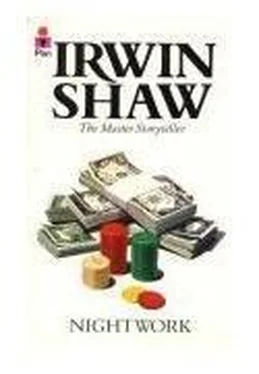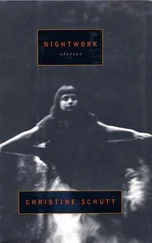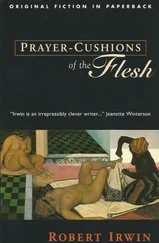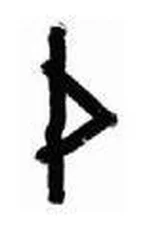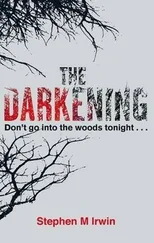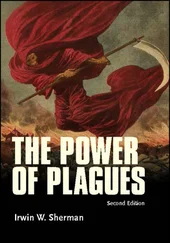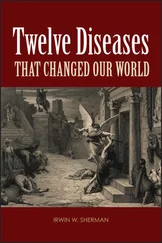Irwin Shaw - Nightwork
Здесь есть возможность читать онлайн «Irwin Shaw - Nightwork» весь текст электронной книги совершенно бесплатно (целиком полную версию без сокращений). В некоторых случаях можно слушать аудио, скачать через торрент в формате fb2 и присутствует краткое содержание. Жанр: Детектив, на английском языке. Описание произведения, (предисловие) а так же отзывы посетителей доступны на портале библиотеки ЛибКат.
- Название:Nightwork
- Автор:
- Жанр:
- Год:неизвестен
- ISBN:нет данных
- Рейтинг книги:3 / 5. Голосов: 1
-
Избранное:Добавить в избранное
- Отзывы:
-
Ваша оценка:
- 60
- 1
- 2
- 3
- 4
- 5
Nightwork: краткое содержание, описание и аннотация
Предлагаем к чтению аннотацию, описание, краткое содержание или предисловие (зависит от того, что написал сам автор книги «Nightwork»). Если вы не нашли необходимую информацию о книге — напишите в комментариях, мы постараемся отыскать её.
Nightwork — читать онлайн бесплатно полную книгу (весь текст) целиком
Ниже представлен текст книги, разбитый по страницам. Система сохранения места последней прочитанной страницы, позволяет с удобством читать онлайн бесплатно книгу «Nightwork», без необходимости каждый раз заново искать на чём Вы остановились. Поставьте закладку, и сможете в любой момент перейти на страницу, на которой закончили чтение.
Интервал:
Закладка:
I had spent the day of Inaugural at Arlington. It seemed a fitting way to celebrate the installation of Richard Nixon as President of the United States.
There was a Grimes buried in the cemetery, an uncle who had died in 1921 from the effects of a dose of chlorine gas in the Argonne Forest. Myself, I would never be buried in Arlington. I was a veteran of no wars. I had been too young for Korea and by the time Vietnam came around I was set in the job with the airline. I had not been tempted to volunteer. Walking among the graves, I experienced no regret that I finally would not be laid to rest in this company of heroes. I had never been pugnacious – even as a boy I had only one fistfight at school – and, although was patriotic enough and saluted the flag gladly, wars had no attraction for me. My patriotism did not run in the direction of bloodshed.
When I went out of the hotel the next morning, I saw there was a long line of people waiting for taxis, so I started to walk, hoping to pick up a taxi along the avenue. It was a mild day, pleasant after the biting cold of New York, and the street I was on gave off an air of grave prosperity, the passersby well-dressed and orderly. For half a block I walked side by side with a dignified, portly gentleman wearing a coat with a mink collar who looked as though he could be a Senator. I amused myself by imagining what the man’s reaction would be if I went up to him, fixed him, like the Ancient Mariner, who stoppeth [7]one of three, and told him what I had been doing since early Tuesday morning.
I stopped at a traffic light and hailed a cab which was slowing to a stop there. It was only after the cab had come to a halt that I saw that there was a passenger in the back, a woman. But the cabby, a black man with gray hair, leaned over and turned down the window. “Which way you going, Mister?” he asked.
“State.”
“Get in,” the cabby said. “The lady is on the way.”
I opened the back door. “Do you mind if I get in with you, ma’am?” I asked.
“I certainly do,” the woman said. She was quite young, no more than thirty, and rather pretty, in a blonde, sharp way, less pretty at the moment than she might ordinarily have been, because of the tight, angry set of her lips.
“I’m sorry,” I said apologetically and closed the door. I was about to step back on the curb, when the cabby opened the front door. “Get in, suh,” the cabby said.
Serves the bitch right. I thought, and, without looking at the woman, got in beside the driver. There was a bitter rustle from the back seat, but neither the cabby nor I turned around. We drove in silence.
When the cab stopped in front of a pillared government building, the woman leaned forward. “One dollar and forty-five cents?” she said.
“Yes ma’am,” the cabby said.
The woman yanked open her purse, took out a dollar bill and some change, and put it down on the back seat. “Don’t expect to find a tip,” she said as she got out. She walked towards the big front doors, her back furious. She had nice legs, I noted.
The cabby chuckled as he reached back and scooped up his fare. “Civil servant.” he said.
“Spelled c-u-n-t,” I said.
The cabby chuckled again. “Oh, in this town you learn to take the fat with the lean,” he said.
As he drove, he shook his head, chuckling to himself, over and over again.
At State, I gave the man a dollar tip. “I tell you, suh,” the cabby said, “that little blonde lady done made my day.”
I went into the lobby of the building and up to the information desk.
“I’d like to see Mr. Jeremy Hale, please,” I said to the girl at the desk.
“Do you know what room he’s in?”
“I’m afraid not.”
The girl sighed. Washington, I saw, was full of tight-assed women. While the girl thumbed through a thick alphabetical list for Jeremy Hale, I remembered how I had once said to Hale, long ago, “With a name like that, Jerry, you had to wind up in the State Department.” I smiled at the memory.
“Is Mr. Hale expecting you?”
“No.” I hadn’t spoken to Hale or written him in years. Hale certainly wasn’t expecting me. We had been in the same class at Ohio State and had been good friends. After I took the job in Vermont we had skied together several winters, when Hale wasn’t on a post overseas.
“Your name, please?” the girl was saying.
I gave her my name and she dialed a number on the desk telephone.
The girl spoke briefly on the phone, put it down, scribbled out a pass. “Mr. Hale can see you now.” She handed me the pass and I saw she had written on it the number of the room I was to go to.
“Thank you, miss,” I said. Too late, I saw the wedding ring on her finger. I have made another enemy in Washington, I thought.
I went up in the elevator. The elevator was nearly full, but it rose in decorous silence. The secrets of state were being well-guarded.
Hale’s name was on a door that was exactly the same as a long row of identical doors that disappeared in diminishing perspective down a seemingly endless corridor. What can all these people possibly be doing for the United States of America eight hours a day, two hundred days a year? I wondered, as I knocked.
“Come in,” a woman’s voice called.
I pushed the door open and entered a small room where a beautiful young woman was typing. Good old Jeremy Hale. The beautiful young woman smiled radiantly at me. I wondered how she behaved in taxicabs. “Are you Mr. Grimes?” she said, rising. She was even more beautiful standing than sitting down, tall and dark, lissome in a tight blue sweater.
“I am indeed,” I said.
“Mr. Hale is delighted you could come. Go right in, please.” She held the door to the inner office open for me.
Hale was seated at a cluttered desk, peering down at a sheaf of papers in front of him. He had put on weight since I had last seen him and had added statesmanlike solidity to the mild polite face. On the desk, in a silver frame, was a family group, a woman and two children, a boy and a girl. Everything in moderation. Zero population growth. An example to the heathen. Hale looked up when I came in and stood, smiling widely. “Doug,” he said, “You don’t know how glad I am to see you.”
As we shook hands, I was surprised at how moved I was by my friend’s greeting. For three years now, no one had been genuinely glad to see me.
“Where’ve you been, where’ve you been, man?” Hale said. He waved to a leather sofa along one side of the spacious office and, as I sat down, pulled a wooden armchair close to the sofa and sat down himself. “I thought you’d disappeared from the face of the earth. I wrote three times and each time the letters came back. Haven’t you learned anything about forwarding addresses yet? And I wrote your girl friend. Pat, asking about you and she wrote back and said she didn’t know where you’d gone.” He scowled at me. He was agreeable-looking, tall, comfortably built, soft-faced, and the scowl was incongruous on him. “And you don’t look so almighty great, either. You look as though you haven’t been out in the open air for years.”
“Okay, okay,” I said, “one thing at a time, Jerry. I just decided I didn’t like flying anymore and I moved on. Here and there.”
“I wanted to ski with you last winter. I had two weeks off and I heard the snow was great… ”
“I haven’t been doing much skiing, to tell the truth,” I said.
Impulsively, Hale touched my shoulder. “All right,” he said. “I won’t ask any questions.” Even as a boy in college he had always been quick and sensitive. “Well, anyway, just one question. Where’re you coming from and what’re you doing in Washington?” He laughed. “I guess that’s two questions.”
Читать дальшеИнтервал:
Закладка:
Похожие книги на «Nightwork»
Представляем Вашему вниманию похожие книги на «Nightwork» списком для выбора. Мы отобрали схожую по названию и смыслу литературу в надежде предоставить читателям больше вариантов отыскать новые, интересные, ещё непрочитанные произведения.
Обсуждение, отзывы о книге «Nightwork» и просто собственные мнения читателей. Оставьте ваши комментарии, напишите, что Вы думаете о произведении, его смысле или главных героях. Укажите что конкретно понравилось, а что нет, и почему Вы так считаете.
